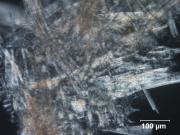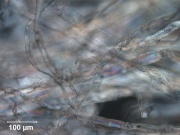Softwood
Description
One of two common classifications for trees, hardwood (angiosperm) and softwood (gymnosperm). Softwoods are coniferous trees. With the exception of the larch and cypress trees, softwoods do not shed their needle-like leaves. Examples of softwood trees are: pine, fir, hemlock, spruce, tamarack, cedar, and redwood. Softwood trees are found in temperate and mountainous regions. Most of softwoods are used for general construction, fences, and paper pulp. Softwood trees tend to have less acetic acid (1-2%) than hardwoods (3-5%) (Hatchfield 2002).
Synonyms and Related Terms
nanboku (Jap.); bois tendre (Fr.); legno di conifera (It.); evergreen; coniferous
Other Properties
Contain tracheids rather than pores. May contain resin channels.
Additional Information
P.Hatchfield, Pollutants in the Museum Environment, Archetype Press, London, 2002.
Authority
- G.S.Brady, G.S.Brady, Materials Handbook, McGraw-Hill Book Co., New York, 1971 Comment: p. 875
- Ralph Mayer, Ralph Mayer, A Dictionary of Art Terms and Techniques, Harper and Row Publishers, New York, 1969 (also 1945 printing)
- Richard S. Lewis, Richard S. Lewis, Hawley's Condensed Chemical Dictionary, Van Nostrand Reinhold, New York, 10th ed., 1993
- Pam Hatchfield, Pam Hatchfield, Pollutants in the Museum Environment, Archetype Press, London, 2002
- Website address 1, Website address 1 Comment: AMOL reCollections Glossary -http://amol.org.au/recollections/7/c/
- Website address 2 Comment: Museum of Japanese Traditional Art Crafts at http://www.nihon-kogeikai.com/ (Jap. term)
- Random House, Random House, Webster's Encyclopedic Unabridged Dictionary of the English Language, Grammercy Book, New York, 1997

